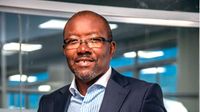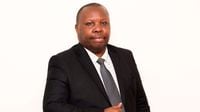John Muteti's simplest pleasure in life
First, you need courage. “Well, someone has to do the job. I could be that someone,” says Professor John Muteti, the acting CEO of the National Authority for the Campaign Against Alcohol and Drug Abuse (Nacada).
Then, you need the belief. “When I set out to do something, I achieve it.” Finally, you need the qualifications. I’d list them here, but we don’t want to induce professional jealousy. Just know that the man is well-read. Conclusion: Muteti = good.
But has he ever done drugs before? Testing, yes, he says. Abusing no, he insists. Probably right. He looks and sounds like the man who has trodden the narrow path all his life, reserved and reticent, sparse in his words and spare in his appearances, occasionally popping up at a wedding or two, but more at home planting trees. Last year, he planted 10,000. Alone.
When he is not cleaning up the drug industry, he is cleaning the environment, and giving the earth new lungs. That’s his idea of letting his hair down, even if you will never see him with hair. Has anyone ever seen John with hair?
He is polite to a fault, almost father-like, certainly pastor-like; you’d be forgiven to think he is a middle-ranking bank employee carefully explaining the pros and cons of asset financing. Maybe this sounds a little like damnation by faint praise. But the truth is, I conclude, he is a true living exemplar of making your bed and lying in it. Which, coincidentally, is what he likes to do every morning. Making the bed.
What’s your favourite thing about yourself?
I like the environment. When people come to my place, they see the plants and flowers in their thousands.
What led you to this?
It's my hobby. I like greening the environment. Every year, I plant thousands of trees. Last year, I did 10,000 trees. I don't do subsistence farming, but I like planting fruit trees like mangoes.
In such a high office, what’s your relationship with God?
I believe in a supernatural power. I was brought up as a Catholic.
Were you God-chosen for this role?
My experience to start with. I have been involved in the drug abuse fight for years. For the last eight years, I have been pushing the drug abuse policy, doing its strategy for Nacada, and heading the programmes. Maybe God thought I'd effectively push the agenda well as a policymaker.
Have you done drugs?
There is a difference between testing and abusing, haha! Initially, I could take a beer or two, but I stopped. I have not done any hard drugs because they don't add any value.
Were you always this passionate?
I come from a small transit town called Emali, a popular spot for truck drivers. I grew up seeing a lot of drug abuse in that area and saw the effects. Most of my friends I grew up with wasted their lives because of drugs. That prompted me to think of the best ways to help people stop abusing drugs.
Is drug abuse a moral or economic issue?
Both. You spend so much money on drugs that your family is impoverished. It is also a moral issue because many crimes result from abusing drugs. You need money to fund this lifestyle, so you resort to crime.
What is this job teaching you?
You need resolve to accomplish the goals you set. I resolved that this [drug abuse] is something we must fight head-on. We must put fear aside. This job needs courage. Otherwise, you'll think the barons will come for you, and you can't get anything done with that mindset.
Do you ever fear for your life?
Well, someone has to do the job. You must sit down and have a conversation with yourself. When cartels realise you are coming for them, they may decide to go for you. But I remind myself that somebody must do the job.
What did you know about drugs then that has helped you now?
That drugs destroy dreams. Especially dreams of the youth. I have seen bright Kenyans who can do extraordinary things ruin their lives. I have also seen the pain of a parent looking helplessly at her child who has gone up to university, losing their way. I saw it happen to my friends' children and classmates I schooled with.
What is life’s simplest pleasure?
Peace of mind and being yourself. Do what you believe in and just be simple. Look at things free from complications. If you see a problem look for the simplest solution for that problem.
How are you at home?
I don’t change. I interact with people in the office the same way I carry myself at home. I treat my staff the same way I treat my children.
What do you think your children are most proud of about you?
I do what I say and keep my promises and I want the best for them.
What’s something you are proud of but never get to brag about?
I walk my talk. If I tell you this is how I think things should be, I don't waver. I don't like doublespeak.
What’s the most boring part about you?
I am not very social. When I am out, I am not very talkative. I am a bit reserved. Most people expect a lot of talking and usually don't get it. That makes me look not so approachable.
What’s your superpower?
My will to get things done. When I set to do something, I have that inner power. When I set targets, I achieve them, whether it is in my life, in academia, in government or family.
What’s your weekend lifestyle like?
I attend weddings and family gatherings, usually on Saturdays. You will find me at community events. I am also the chair of the Board of Management of a secondary school. My weekend is for family and the community.
Exercise?
I walk around, especially when I go home to plant my trees. My place is very green.
What was your nickname growing up?
In secondary school, they used to call me ‘Kasee’ because I used to behave like an old man, haha! After high school, I went to Kangaru School, they used to call me ‘kayamba.’
Why?
We used to have a place where we could play musical instruments. One of those was kayamba [a percussion instrument]. It makes a lot of noise. We formed a group with my friends, and we all used to call each other kayamba.
What remains unchanged about you since childhood?
The belief in fairness. I have always believed in humility and fairness and that everybody needs a chance. Equality, basically.
Are you a reader?
I am a scholar. I am the editor-in-chief of a journal, the AJADA—Africa Journal for Alcohol and Drug Abuse. I write and edit articles. My way of relaxing at home is by watching political documentaries and documentaries on development.
What’s the last documentary you watched that changed your way of thinking?
Former US President Obama's documentary on how he started his work with communities. It taught me that you can start something small and watch it have a global impact.
Is there something new you’ve been considering trying lately?
Recently, I was reading a book titled Walking in Wisdom by David Oyedepo. It shows us how we make decisions, what we should consider, and how to harness the wisdom from people. When we come across people, they usually give you words of wisdom, so how do you harness that? And also making the bed. There is an American US Navy, Admiral William McRaven, who has written a book called 'Make Your Bed.' These are little things that you do but can impact your life. Making your bed may be a small thing but it's the small things that can change your life.
What’s the most painful thing you’ve been told?
That my mother has passed away. It’s the worst pain imaginable.
What’s a misconception people have about you?
That I am not decisive. Or when I resolve to do something I don't have a strong will. My will is unyielding.
What is one lesson you wish you had learned earlier in life?
You shouldn't trust everyone. I am a very trusting person. But in this world, many people will say something and mean another.
What is the best compliment you’ve received?
You are doing a fantastic job. You are making things happen.
What will your billboard say about you?
Here lies a fair man.
Working here, if you don’t drink or smoke, is it true that you may be a womaniser?
I don’t take drugs; I don’t drink and I have been married for the last 30 years. I have no reason to do all those things.
What’s the secret to your marriage?
Being fair to your spouse, your children, and yourself.
What do you love most about your wife?
She is very supportive. We look at things from the same perspective and share dreams.
Chapo ndengu or chapo beans?
Chapo beans. BY BUSINESS DAILY










Post a Comment